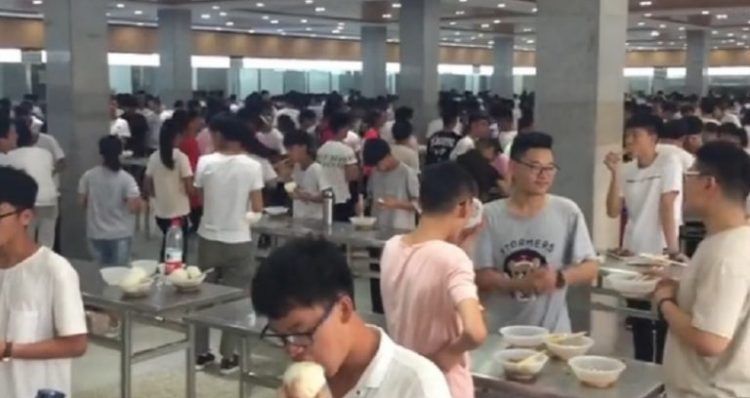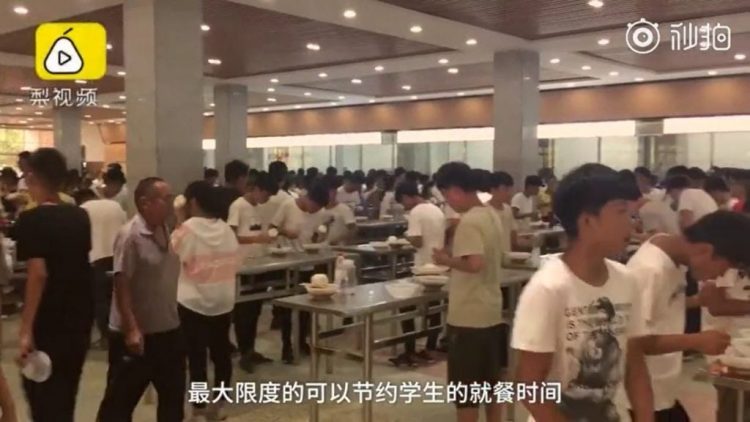A high-school in the Chinese city of Shangqiu, Henan Province, recently attracted criticism for removing cafeteria chairs to motivate student to eat faster and dedicate more time to their studies.
Students returning from their summer break were shocked to learn that they would have to start eating standing up after their school’s administrators decided to remove the chairs and benches to deter students from lingering around after finishing their meal. A spokesperson for the Shangqiu school told reporters that management also plans to implement assigned spots for each student to stand in, to further discourage them from wasting time instead of studying.

“Next, we’ll designate a lunch spot at the table for everyone to eat standing on their feet. On average, spending 10 minutes on lunch is enough,” a school employee says in a Pear video that recently went viral on Chinese social media.
The controversial move is believed to have been inspired by the draconian rules of “gaokao factories”, top Chinese high-schools infamous for using military-style disciplining techniques to prepare students for the Gaokao, China’s notoriously difficult college entrance exam. At some of these schools, classes start at 5:30 a.m. every day, and one of them even has two tanks installed at the entrance to motivate students.
Interestingly, a student from one of these gaokao factories commented that despite their grueling studying schedule, even they have cafeteria chairs.

The move has drawn a lot of criticism online, with many people arguing that it will not influence students’ performance at all, and might even lead to unhealthy eating habits.
“They’ll probably shut down the dining hall in the second term at this rate because according to their logic, it’ll really improve productivity if no one eats at all,” one person commented on Weibo, China’s version of Twitter.
“Don’t prisoners sit while they eat?” another person asked rhetorically.
This is only the latest in a series of bizarre techniques Chinese schools have been testing in order to improve their performance. Back in May, we wrote about a school in Hangzhou that implemented face-reading technology to make sure students are paying attention in class.
Latest Stories
-
There are more women than men, but there’s a man for every woman – Rev. Nana Yaa
19 minutes -
Nii Kwei releases ‘The Praise Medley’, a celebration of God’s goodness
25 minutes -
Mistakes in team composition can be costly, pray for us – Fifi Kwetey appeals to Ghanaians
26 minutes -
Mahama forms 5-member Hajj task force to cut pilgrimage costs
49 minutes -
Fuel shortage hits Sissala East and West Districts
1 hour -
President Mahama orders immediate probe into 2020 and 2024 election fatalities
1 hour -
Ken Thompson applauds John Mahama’s initial ministerial appointments
1 hour -
Shatana drops new single “Monicitamol” to inspire women
1 hour -
Mahama calls on party supporters, and others fomenting trouble to act responsibly
1 hour -
We’ll have 2 holidays for Eid al-Fitr celebrations this year – Mahama
2 hours -
Effiduasi market women hit streets in demand for access to stalls after paying contractor
2 hours -
GNAT urges gov’t to prioritise education sector challenges just as it’s tackling energy issues
2 hours -
Free SHS can’t continue; parents must pay for feeding, accommodation – NAGRAT President
2 hours -
Mahama demands update from IGP on election-related deaths in 2020, 2024
2 hours -
It’s a boy! Moses Bliss and wife welcome first child
2 hours

